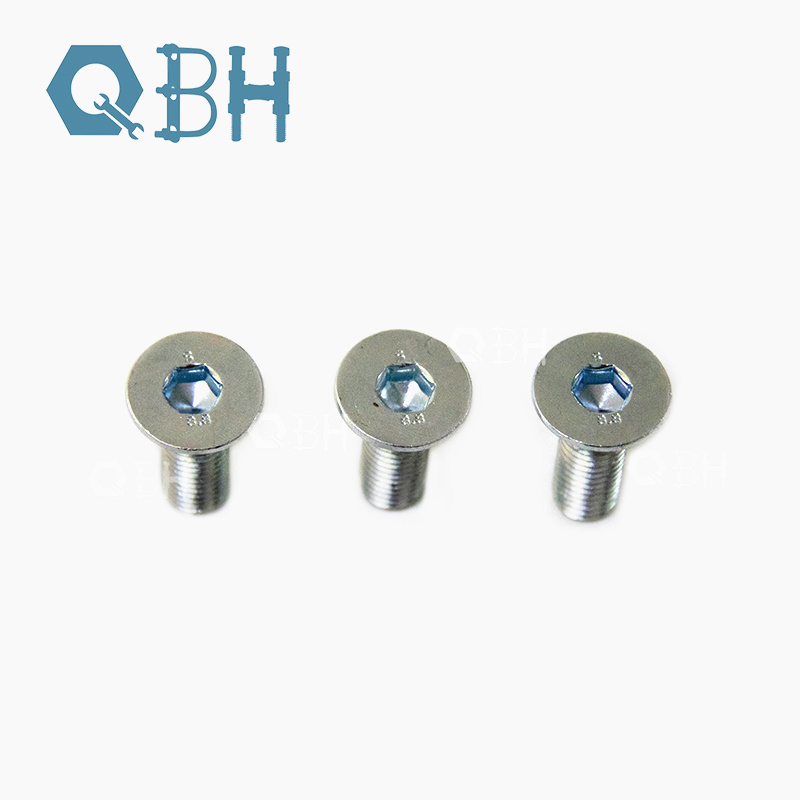Why Choose Socket Bolts for Secure and Reliable Fastening?
2025-09-25
Socket bolts are widely recognized in construction, automotive, machinery, aerospace, and manufacturing because of their precision, strength, and versatility. Unlike ordinary bolts, they are engineered for situations where durability and a clean finish are crucial.
What Are Socket Bolts and Why Do They Matter?
Socket bolts, also known as hex socket bolts or Allen bolts, are fasteners designed with a cylindrical head and an internal hexagonal drive. They are tightened or loosened using an Allen key (hex wrench) or socket driver, which allows for more torque compared to traditional slotted or Phillips head screws. Their design reduces the chance of stripping, ensures a neat appearance, and makes them ideal for compact spaces.
Key Advantages of Socket Bolts
-
High Strength – Manufactured from alloy steel, stainless steel, and other durable materials, socket bolts can withstand heavy loads and high stress.
-
Space Efficiency – The recessed hex design enables fastening in areas with limited clearance.
-
Enhanced Safety – The secure fit minimizes slipping during installation.
-
Aesthetic Finish – Their flush fit provides a cleaner look, often preferred in high-end machinery or visible installations.
-
Versatility – Available in multiple grades, coatings, and head styles to match diverse industry needs.
Socket bolts matter because they strike a balance between strength and accessibility. In industries where reliability is non-negotiable, socket bolts deliver precision fastening with reduced maintenance requirements.
How Do Socket Bolts Work and What Are Their Parameters?
Understanding how socket bolts function requires a closer look at their engineering. The internal hex drive allows tools to engage securely, distributing torque evenly across the bolt. This design ensures less wear and tear, higher tightening efficiency, and long-lasting performance.
Typical Socket Bolt Parameters
| Parameter | Specification Options |
|---|---|
| Head Types | Socket cap head, button head, flat head, countersunk head |
| Material | Carbon steel, alloy steel (Grade 8.8, 10.9, 12.9), stainless steel (A2, A4), titanium |
| Surface Finish | Black oxide, zinc plated, hot-dip galvanized, nickel plated |
| Thread Types | Metric (M3–M36), UNC, UNF, BSW, custom threads |
| Tensile Strength | 800–1200 MPa (depending on grade and material) |
| Sizes Available | Lengths from 6 mm to 300 mm |
| Torque Capacity | Varies by diameter and material, generally higher than standard bolts |
These specifications ensure that socket bolts can meet both general and specialized applications. For example, Grade 12.9 socket bolts are often used in automotive engines where high tensile strength is mandatory, while stainless steel socket bolts are chosen for environments exposed to moisture or chemicals.
How They Work in Practice
-
Installation – A hex key is inserted into the head drive, providing secure engagement and reducing the chance of slippage.
-
Load Distribution – The deeper head socket allows better torque transfer without damaging the bolt.
-
Durability – Their precision design minimizes wear, making them suitable for repeated tightening cycles.
Socket bolts provide both functional and aesthetic benefits, ensuring structural stability while meeting engineering requirements.
Why Are Socket Bolts Widely Used Across Industries?
Socket bolts are not just another fastener; they are the backbone of critical projects. Their application spans multiple industries because they outperform many traditional fastening solutions.
Major Industry Applications
-
Automotive and Transportation
-
Used in engines, suspension systems, and transmission assemblies.
-
High-strength socket bolts ensure safety under constant vibration and stress.
-
-
Construction and Structural Engineering
-
Provide stability in steel frameworks, bridges, and heavy-duty connections.
-
Their neat finish is valued in visible architectural designs.
-
-
Aerospace
-
Lightweight but strong socket bolts are used in aircraft components where safety and performance are paramount.
-
-
Manufacturing and Machinery
-
Ideal for securing moving machine parts, reducing downtime caused by loose fasteners.
-
Precision-grade socket bolts allow exact torque settings for sensitive machinery.
-
-
Marine and Offshore Applications
-
Stainless steel and coated socket bolts resist corrosion in saltwater environments.
-
Why They Outperform Other Bolts
-
Strength-to-Size Ratio – Socket bolts offer maximum strength without requiring a bulky design.
-
Precision Fit – Perfect for critical joints where tight tolerances are essential.
-
Customizability – Manufacturers can tailor bolts to meet unique load-bearing and environmental conditions.
Socket bolts are essential because they adapt to diverse requirements without compromising safety or longevity.
How to Choose the Right Socket Bolt and Where to Source Them?
Choosing the right socket bolt requires a clear understanding of the project requirements. Several factors must be considered to ensure optimal performance.
Selection Guide
-
Identify the Load Requirements
-
For high-stress environments, choose alloy steel Grade 10.9 or 12.9.
-
For moderate loads, stainless steel A2 offers both durability and corrosion resistance.
-
-
Consider the Environment
-
Corrosive environments: Stainless steel or coated bolts.
-
High-temperature environments: Heat-resistant alloy bolts.
-
-
Choose the Correct Head Type
-
Cap Head: High strength, suitable for heavy machinery.
-
Button Head: Lower profile, for decorative or space-limited areas.
-
Flat Head: Countersunk applications, flush finish.
-
-
Check Standards and Compliance
-
Ensure compliance with ISO, DIN, ANSI, or ASTM standards.
-
Verify tensile strength and thread accuracy.
-
-
Match the Right Tools
-
Use precision Allen keys or socket drivers to avoid head damage.
-
Example Use Case
In an automotive assembly line, engineers select Grade 12.9 socket cap bolts because they can withstand high torque and dynamic vibrations without loosening. In contrast, a marine construction company might select A4 stainless steel bolts with hot-dip galvanization for long-term corrosion resistance.
Common Mistakes to Avoid
-
Using low-grade bolts in high-stress environments.
-
Ignoring coating requirements for outdoor or marine conditions.
-
Over-tightening, which can strip threads or damage components.
By evaluating load, environment, and compliance standards, businesses can prevent costly failures and ensure reliability.
FAQs About Socket Bolts
Q1: What makes socket bolts stronger than regular bolts?
A1: Socket bolts are manufactured from higher-grade alloy or stainless steels and have deeper head engagement, which allows higher torque application without damaging the head.
Q2: How do I prevent socket bolts from loosening under vibration?
A2: Use locking washers, thread-locking compounds, or select self-locking socket bolts specifically designed for vibration-heavy applications.
Q3: Are stainless steel socket bolts suitable for outdoor use?
A3: Yes, stainless steel socket bolts (A2 or A4 grade) are corrosion-resistant, making them ideal for outdoor, marine, or chemically exposed environments.
Socket bolts are indispensable for industries that demand strength, precision, and reliability. From automotive engineering to aerospace and construction, these fasteners guarantee performance under challenging conditions. Their versatility in head styles, grades, and coatings ensures they adapt to diverse applications, while their clean finish and compact design make them a preferred choice in visible or space-limited assemblies.
For businesses looking to secure dependable fastening solutions, QBH offers a comprehensive range of socket bolts manufactured to international standards, ensuring both quality and consistency. Whether you require high-tensile strength, corrosion resistance, or custom specifications, QBH delivers products tailored to your needs.
If you are ready to upgrade your fastening systems, contact us today and let our experts guide you toward the most reliable socket bolt solutions.





